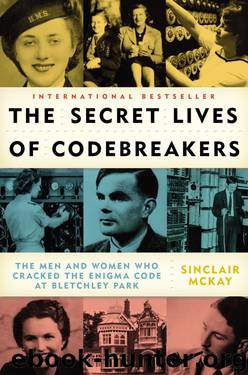The Secret Lives of Codebreakers by Sinclair McKay

Author:Sinclair McKay [McKay, Sinclair]
Language: eng
Format: epub, mobi
Tags: History, Military, World War II, Europe, Great Britain
ISBN: 0452298717
Google: sDwkQ-NMj7gC
Amazon: B0095ZMT50
Publisher: Plume
Published: 2012-09-24T18:30:00+00:00
Perhaps there were outbreaks of resentment, as opposed to dissent—some service personnel regarded the civilians as being rather spoiled and pampered, with their games of tennis and their picnics, and suspected them of having somehow dodged their duty.
Later in the war, there were those, such as Captain Jerry Roberts, who although in the Service, were deemed more valuable working (as he did) on the “Tunny” codes. But did Captain Roberts never feel a pang of frustration that his orders were to remain in the Park?
“I suppose I should have been unhappy that I wasn’t fighting the true fight but this never bothered me,” Captain Roberts now says. “One knew that this was immensely more important than any other single contribution that you could make as a soldier, or as an officer.”
But by 1942, the understandable harrying of the cryptographers by the services—with inevitable conflict about whether the navy or the military should be accorded more time for their respective codes to be run through the bombe machines—was never ending. Some kind of a solution was eventually reached. “A sudden demand by Hut 8 for a large number of machines would seriously disrupt the program and the question of how many bombes for Naval, and how quickly, was often a difficult one to answer satisfactorily,” recalled one veteran. “Moreover, only the technicians could answer it; the intelligence sections could lay down orders of priority in general terms, but the detailed decisions depended upon technical considerations. A body of five bombe controllers was therefore formed and a rota arranged, so that one of us was always on duty and available to act as bombe controller.”
Those men in civvies at Bletchley Park had their chance to fulfill a certain kind of service obligation, chiefly in the form of the Home Guard. For some, this proved to be an onerous distraction. Keith Batey recalls: “I’d be engaged on breaking a cipher or something, and then had to put it down and pretend to go and be a—It was bloody silly, especially in 1944 when there was no danger of invasion. It was organized, we all had to do it, and we all had these stupid uniforms too. It really was fatuous.”
Conversely, Oliver Lawn found this dash of military experience provided some welcome light relief away from the serious business of cracking ciphers. “We all joined the Home Guard, where we had fun and games. And we went out on to the fields beyond Bletchley and watched to see if any German parachutes came in overnight.
“Academics in the Home Guard were great fun,” he adds. “You can imagine, Dad’s Army, some of them, the most brilliant, were the most extreme…though one or two had army backgrounds. There was one chap called Michael Bannister, whose father was in the army. Bannister was very much the army type, and he tried to bring in all the army stuff, but without success. So he was the exception. We were very lame.”
Alan Turing was initially rather taken with the
Download
The Secret Lives of Codebreakers by Sinclair McKay.epub
The Secret Lives of Codebreakers by Sinclair McKay.mobi
This site does not store any files on its server. We only index and link to content provided by other sites. Please contact the content providers to delete copyright contents if any and email us, we'll remove relevant links or contents immediately.
| Arms Control | Diplomacy |
| Security | Trades & Tariffs |
| Treaties | African |
| Asian | Australian & Oceanian |
| Canadian | Caribbean & Latin American |
| European | Middle Eastern |
| Russian & Former Soviet Union |
The Secret History by Donna Tartt(18064)
The Social Justice Warrior Handbook by Lisa De Pasquale(11932)
Thirteen Reasons Why by Jay Asher(8402)
This Is How You Lose Her by Junot Diaz(6404)
Weapons of Math Destruction by Cathy O'Neil(5784)
Zero to One by Peter Thiel(5450)
Beartown by Fredrik Backman(5296)
The Myth of the Strong Leader by Archie Brown(5206)
The Fire Next Time by James Baldwin(4993)
How Democracies Die by Steven Levitsky & Daniel Ziblatt(4935)
Promise Me, Dad by Joe Biden(4893)
Stone's Rules by Roger Stone(4822)
100 Deadly Skills by Clint Emerson(4651)
Rise and Kill First by Ronen Bergman(4530)
A Higher Loyalty: Truth, Lies, and Leadership by James Comey(4523)
The David Icke Guide to the Global Conspiracy (and how to end it) by David Icke(4352)
Secrecy World by Jake Bernstein(4346)
The Farm by Tom Rob Smith(4296)
The Doomsday Machine by Daniel Ellsberg(4224)
